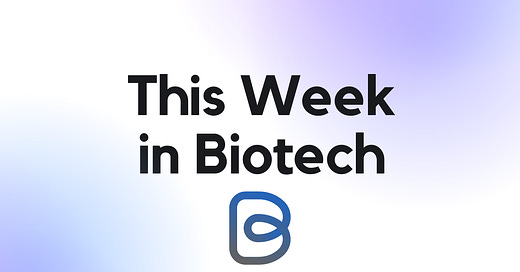This Week in Biotech #53
Catch up on the latest biotech breakthroughs and upcoming trends (May 16-22, 2025).
Hi and welcome to This Week in Biotech by Biotech Blueprint, edition 53.
Biotech Blueprint is now a podcast. You can find us on YouTube, Spotify, and Apple Podcasts.
THIS WEEK’S KEY TAKEAWAYS 🔑
Hinge Health priced its IPO at $32, quickly rising to $39 and landing at a $3.7B valuation. It’s the first digital health debut in some time that didn’t fall flat, raising $500M and signaling that public markets may be willing to engage with healthcare tech again.
The FDA granted full approval to Novavax’s COVID-19 vaccine for older and high-risk individuals, marking the first recombinant protein-based shot cleared in the U.S. Meanwhile, Moderna withdrew its application for a flu/COVID combo shot, citing the need for more data. The shift comes as the FDA tightens standards, now requiring new clinical trials for annual boosters in healthy people under 65.
Sanofi announced a $470M acquisition of Vigil Neuroscience, picking up a TREM2-targeted Alzheimer’s drug now entering phase 2. It’s a small but strategic addition to Sanofi’s growing neurology pipeline.
Instil Bio reported early phase 2 data for its PD-L1xVEGF bispecific antibody in NSCLC, showing a 23% response rate. The market rewarded it with a 57% jump, somewhat optimistic, but not out of step with current enthusiasm for targeted immunotherapy platforms.
The FDA also approved the first blood-based test for Alzheimer’s diagnosis, offering a less invasive alternative to PET scans. While not a standalone tool, it could significantly broaden access to earlier detection.
On the policy side, HHS released new details on the Most Favored Nation pricing initiative, seeking to cap U.S. drug prices at the lowest paid among wealthy countries. Pharma is expected to push back, but the agency signaled it’s ready to enforce.
Finally, RFK Jr.’s “Make America Healthy Again” report laid out an unorthodox but revealing policy roadmap: skeptical of vaccine mandates, critical of glyphosate and processed food, and pushing for large-scale nutrition studies. It lacks legal force, but will guide the administration’s next 100 days.
🎙️ AI SUMMARY
Listen to an AI-generated summary of this episode below.
MARKET UPDATES
🔹 Hinge Health made a strong debut on the New York Stock Exchange under the ticker "HNGE," pricing its IPO at $32 per share and quickly rising to $39, valuing the company at approximately $3.7B. The digital health startup, which provides AI-powered at-home musculoskeletal care and rehabilitation, raised roughly $500M by offering 13.7M shares. Despite being valued at $6.2B in its 2021 Series E round, Hinge’s offering reflects a significant discount, consistent with current IPO market conditions. Still, the offering is being seen as a potential signal of renewed investor interest in digital health. Backed by Tiger Global and Coatue, Hinge Health now serves nearly half of Fortune 500 companies and has around 20 million contracted lives. The company is also exploring expansion into Medicare Advantage and fully insured plans.
🔹 Psychedelic drug stocks rose for a second consecutive session following comments from FDA Commissioner Marty Makary, who stated that evaluating therapies like psilocybin and MDMA will be a “top priority” under the Trump administration. In a NewsNation interview, Makary highlighted the importance of listening to doctors and patients, especially in the treatment of PTSD among veterans, and called for expedited, independent reviews of psychedelic therapies. While he emphasized the need for solid data, his remarks suggest a more open regulatory stance compared to the Biden administration, which rejected an MDMA-based PTSD therapy last year. Companies such as MindMed (MNMD), Atai Life Sciences (ATAI), COMPASS Pathways (CMPS), and Cybin (CYBN) saw their shares move higher in response.
Read Biotech Blueprint’s article on this topic here:
BIOTECH/PHARMA NEWS
🔹 The FDA has approved Arcutis Biotherapeutics’ Zoryve topical foam 0.3% for the treatment of plaque psoriasis in adults and adolescents aged 12+. This steroid-free, once-daily foam offers a new option for treating psoriasis on both the scalp and body. Clinical trials showed Zoryve delivered strong clearance rates and rapid itch relief, with more than 65% of patients seeing significant improvement in scalp itch by week 8. ZORYVE foam is now the fifth FDA-approved formulation in Arcutis’ growing dermatology portfolio, which also includes treatments for atopic dermatitis and seborrheic dermatitis.
🔹 Sanofi announced it will acquire clinical-stage biotech Vigil Neuroscience for $470M in cash, plus a $2/share contingent value right tied to future sales. The deal adds VG-3927, an oral TREM2 agonist in phase 2 development for Alzheimer’s disease, to Sanofi’s neurology pipeline. TREM2 activation is believed to boost the neuroprotective role of microglia in neurodegenerative diseases. The acquisition builds on Sanofi’s $40M strategic investment in Vigil last year and supports its broader focus on neurology. The transaction is expected to close in Q3 2025. Vigil’s second program, VGL101, is not included in the deal.
🔹 Moderna announced it has voluntarily withdrawn its Biologics License Application for mRNA-1083, a combination flu and COVID-19 vaccine for adults aged 50+, following discussions with the FDA. The company plans to resubmit the application later this year after obtaining efficacy data from its ongoing phase 3 trial of the flu vaccine candidate mRNA-1010, with interim results expected this summer. The move comes amid broader regulatory shifts, including the FDA’s new requirement for additional clinical trials for COVID-19 booster approval in healthy individuals under 65. Moderna’s stock dipped ~7% following the news, reflecting investor concerns over declining COVID vaccine revenues and ongoing regulatory uncertainty. Despite the setback, the company says it remains on track for a separate FDA decision this month regarding its next-generation COVID-19 vaccine, mRNA-1283.
🔹 Paratek Pharmaceuticals acquired Optinose, Inc. in a deal valued at $330M. Optinose shareholders received $9 per share in cash and may receive up to $5 per share in additional payments if sales milestones for Optinose’s product Xhance are met. Xhance is a nasal drug-device combination for chronic rhinosinusitis and joins Paratek’s portfolio alongside their pioneer antibiotic Nuzyra (omadacycline), used for community-acquired bacterial pneumonia and skin infections.
🔹 The U.S. Department of Health and Human Services (HHS) provided an update on its implementation of President Trump’s executive order on “Most-Favored-Nation” drug pricing, aiming to lower prescription drug costs by aligning U.S. prices with those in other high-income countries. Under the policy, manufacturers must match or beat the lowest price paid in OECD countries with GDP per capita at least 60% of that of the U.S. HHS Secretary RFK Jr. and CMS Director Dr. Mehmet Oz are expected to release specific pricing targets in the coming weeks. The initiative, part of a broader strategy to eliminate what the administration calls “global freeloading,” is intended to ensure Americans no longer pay disproportionately high prices for life-saving medications. While supporters argue it could end international cost disparities, critics warn it may face legal hurdles and disrupt global pharmaceutical pricing. Drugmakers may be forced to renegotiate prices abroad, potentially raising costs in countries like Germany and Canada. Industry groups and analysts remain skeptical of the policy’s feasibility, but HHS has signaled it is prepared to enforce compliance if manufacturers fail to voluntarily adjust prices.
🔹 Regeneron will acquire most of 23andMe’s assets, including its consumer genetics business and research services, for $256M as part of a sale tied to 23andMe’s Chapter 11 bankruptcy proceedings. Regeneron has pledged to uphold 23andMe’s existing privacy policies, with a court-appointed ombudsman reviewing the privacy implications. The acquisition is pending court and regulatory approvals, with a final hearing scheduled for Jun. 17. Regeneron aims to build on 23andMe’s consumer genomics platform while using the data to enhance its drug discovery capabilities, reinforcing its long-term bet on genetics as a pillar of precision medicine.
🔹 The FDA has granted full approval to Novavax’s COVID-19 vaccine, Nuvaxovid, for use in adults 65+ and high-risk individuals aged 12-64. It is now the only recombinant protein-based, non-mRNA COVID vaccine approved in the U.S. The approval triggered a $175M milestone payment from Sanofi, which is also handling commercialization. Novavax plans to deliver its updated 2025-2026 formulation this fall, pending FDA strain guidance. Shares of Novavax (NVAX) surged 16% following the news.
🔹 On May 16, the FDA cleared the first blood test to aid in diagnosing Alzheimer’s disease, marking a major step toward more accessible and less invasive detection. The Lumipulse G pTau217/β-Amyloid 1-42 Plasma Ratio test, developed by Fujirebio Diagnostics, identifies Alzheimer’s-associated amyloid plaques using a simple blood draw, reducing reliance on costly and invasive PET scans or spinal taps. Designed for adults 55+ with cognitive symptoms, the test showed high accuracy in clinical trials, with over 90% of positive results aligning with confirmed plaque presence. While not a standalone diagnostic tool, it offers a significant advancement in early Alzheimer’s detection and was granted Breakthrough Device designation by the FDA.
🔹 BioMarin will acquire Inozyme Pharma for $270M in an all-cash deal, adding INZ-701, a promising phase 3 enzyme replacement therapy for ENPP1 Deficiency, to its portfolio. This rare genetic disorder severely impacts the cardiovascular system and bones, with high mortality risk in infants and no approved treatments to date. INZ-701 could become the first therapy for the condition, with pivotal pediatric data expected in early 2026 and potential FDA approval in 2027.
🔹 A federal jury has ordered Amgen to pay Regeneron over $406M for using anticompetitive tactics to boost sales of its cholesterol-lowering drug Repatha. The jury found that Amgen bundled Repatha with its blockbuster anti-inflammatory drugs to pressure pharmacy benefit managers into favoring it over Regeneron’s competing drug, Praluent. The verdict includes $271M in punitive damages. Regeneron’s CEO called the ruling a win against monopolistic behavior, while Amgen maintains it acted lawfully and plans to challenge the decision.
CLINICAL TRIAL UPDATES
🔹 Instil Bio and ImmuneOnco announced that their phase 2 trial of ‘2510, a PD-L1xVEGF bispecific antibody combined with chemotherapy for first-line non-small cell lung cancer (NSCLC) in China, is on track to complete enrollment by Q3 2025, with initial data expected in the second half of the year. The companies plan to launch a phase 3 trial in mid-2026, pending regulatory discussions. Preliminary monotherapy data from China show a 23% response rate in relapsed/refractory NSCLC, aligning with competitor benchmarks. The therapy, designed with a VEGF trap and enhanced tumor-targeting mechanism, continues to show promise in preclinical and early clinical settings. Shares of Instil Bio surged 57% on the news, signaling strong investor enthusiasm around the asset’s potential.
🔹 Alnylam’s RNAi therapy Amvuttra (vutrisiran) continues to demonstrate significant clinical benefit for patients with transthyretin amyloidosis with cardiomyopathy (ATTR-CM), according to new 42-month data from a phase 3 study presented at the Heart Failure 2025 Congress. The therapy reduced all-cause mortality by 36% and cardiovascular mortality by 33%, while cutting urgent heart failure visits by 46% compared to placebo.
PUBLIC HEALTH SPOTLIGHT
🔹 Health Secretary Robert F. Kennedy Jr. released the “Make America Healthy Again” (MAHA) report, outlining sweeping critiques of vaccines, American food standards, prescription drugs, and environmental chemicals. The report questions the safety and necessity of childhood vaccine mandates, promotes placebo-controlled vaccine trials, and raises alarm over pesticide use, especially glyphosate. It also criticizes ultraprocessed foods and calls for large-scale NIH studies on nutrition, despite proposed NIH budget cuts. While the report lacks legal force, it will inform a 100 day policy planning effort.
🔹 The FDA announced it will tighten approval standards for annual COVID-19 boosters, requiring vaccine makers to conduct new clinical trials for healthy individuals aged 6 months to 64 years. Going forward, only older adults and people with underlying health conditions will be automatically eligible for updated shots. FDA leaders Marty Makary and Vinay Prasad cited uncertain benefits for repeated dosing in healthy populations and emphasized the need for more evidence. The move could limit insurance coverage and complicate rollout timelines, but will not impact access for high-risk groups, an estimated 100-200 million Americans. Shares of vaccine makers like Moderna, Pfizer, and BioNTech rose following the announcement, as the policy leaves the existing market largely intact.
🔹 The WHO has adopted a global pandemic agreement aimed at preventing a repeat of the inequities seen during Covid-19. The legally binding pact requires participating countries to reserve 20% of vaccines, medicines, and diagnostics for the WHO during future pandemics to ensure equitable access. WHO Director-General Tedros hailed it as a “victory for public health,” but the absence of the U.S., which withdrew from negotiations under President Trump, casts doubt on its effectiveness. Though 124 countries voted in favor, critics warn the agreement lacks enforcement and strong implementation mechanisms. The treaty will not take effect until a separate annex on sharing pathogen data is finalized, which could take up to two years.
ON THE HORIZON
🔹 May 2025 FDA PDUFAs:
May 22: The FDA is expected to decide on Arcutis Biotherapeutics’ application for Zoryve (roflumilast) foam, a daily topical treatment for scalp and body psoriasis in patients 12+. ✅ APPROVED
May 23: The FDA is set to decide on Sanofi’s sBLA for MenQuadfi, a quadrivalent meningococcal vaccine, which could expand its use to infants as young as 6 weeks for protection against Neisseria meningitidis serogroups A, C, W, and Y.
May 24: The FDA is expected to decide on Liquidia’s resubmitted NDA for Yutrepia, an inhaled treprostinil powder for treating pulmonary arterial hypertension, following tentative approval last year.
May 26: Decision on Merck’s supplemental application for Welireg (belzutifan) to treat advanced pheochromocytoma and paraganglioma (rare neuroendocrine tumors).
May 28: The FDA has extended the PDUFA goal date for Eton Pharmaceuticals’ ET-400, a therapy for a rare pediatric disease, to allow more time to review supplemental data submitted in Dec. 2024.
May 31: Moderna’s next-generation COVID-19 vaccine (mRNA-1283).
Have a great rest of your week and thanks for reading Biotech Blueprint!
👩🏻💻 BIOTECH BLUEPRINT CONSULTING
We have a new website: biotechblueprint.com!
We provide tailored consulting solutions designed to meet the unique challenges of both established companies and startups. The services span a wide range of strategic and technical needs.
BOOK A FREE 30-MINUTE CONSULTATION OR A MEET & GREET below.
DISCLAIMER: This content is for informational purposes only. It should not be taken as legal, tax, investment, financial, or other advice. The views expressed here are my own and do not reflect the opinions of any company or institution.
DISCLOSURE: I have no business relationships with any company mentioned in this article.








Hey Katarina!
Given your interest in Biotech, you might enjoy my recent biotech piece on eXoZymes Inc. They’ve just commercially launched a cell-free enzyme biocatalysis platform that converts biofeedstocks into targeted chemical products.
Plus they just announced their first subsidary which synthesises N-trans-caffeoyltyramine (NCT) to treat MASLD/MASH. Very very interesting compound that has immense potential
https://www.slack-capital.com/p/exozymes-research-report